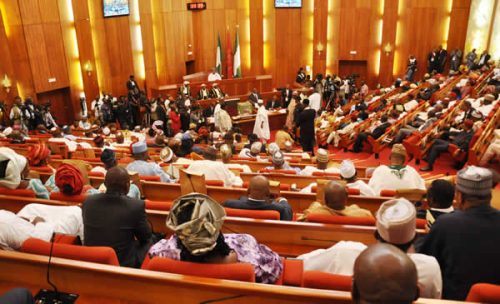A civil society organisation, Peering Advocacy and Advancement Centre (PAACA), has identified proportional representation and internal democracy within political parties as means of curbing frequent carpet crossing by politicians and political office holders.
Executive Director of PAACA, Mr Ezenwa Nwangwu, stated this in an interview with the News Agency Agency of Nigeria (NAN) on Wednesday in Abuja.
According to him, most Nigerian politicians have seen political parties as special purpose vehicles of getting to power.
Nwangwu said that many of them were not inclined to playing opposition because the system being operated in the country encouraged a winner-takes-all syndrome.
“The real issue is that our politicians are not wired to play opposition politics; the very few of them who have the capacity to do so have themselves become part of the ruling parties.
“So what we need to do is to have a system which will not encourage a winner-takes-all approach.
“We can have a proportional representation where, if you score a certain number of votes, you can be in parliament.
“Power can be shared in a way that it can accommodate opposition.
“The system we are running now, if you are in the opposition in the House of Representatives, you may not get a good committee and once you don’t get a good committee, you will be irrelevant to your people,” he said.
Nwangwu said that the winner-takes-all approach had made it difficult for people to be principled and stick to any identifiable value that could promote public good.
According to the PAACA boss, another way of curbing carpet crossing among politicians is to strengthen internal democracy within political parties.
“We need to allow for contests and healthy competition within and among political parties and we should abide by the laws in those political parties.
“Also, we should open political parties for public scrutiny.
“The idea that whatever political parties do is their internal affairs is no longer holding water because at the end of the day, INEC does not produce candidates.
“It is the parties that bring candidates for people to elect. So it is whoever the parties present that people will vote for.
“Therefore, we need to strengthen the political parties in a way that aligns them with the values that we are looking forward to as a people,” he said.
These, Nwangwu said, included good governance, transparent government and the rule of law.
“Rule of law should start from the political parties, not outside because they conduct the most important election, which is primary elections.
“The secondary elections are conducted by INEC. So if the quality of the primary elections is poor, then what you have in the secondary election will not be any better,” he said.
The executive director called for a new orientation for constituents to ensure that their representatives know their roles and focus on their mandates.
“If you’re in the legislature, you know that you don’t have business fighting for projects.
“You’re to make good laws, carry out oversight functions, represent your people effectively and protect their interests.
“But now, whether you’re in the executive, legislature or judiciary, the people’s idea of representation is that you must bring projects home and share money; whereas, all of these corrupt the process.
“When these measures are taken and people stop expecting money from their representatives, the issue of carpet crossing will reduce to a great extent,” he said.
On his part, the Executive Director, Organisation of Justice for Equity Sustenance, Mr Tunde Bafunsho, attributed frequent cross carpeting to politician’s idea of winning elections at all cost.
Bafunsho said that the country’s constitution also provided for free party membership and defection, particularly in case of crisis in any political party.
“The trend will continue due to the legal backing, freedom of association and economic challenges,” he said.


